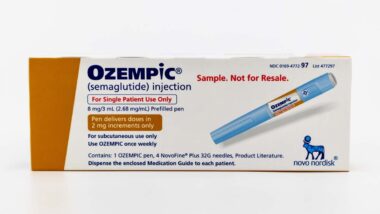Top Class Actions’s website and social media posts use affiliate links. If you make a purchase using such links, we may receive a commission, but it will not result in any additional charges to you. Please review our Affiliate Link Disclosure for more information.
Canadians who were prescribed and used Abilify and Abilify Maintena may qualify as a Class Member of a nationwide Abilify class action lawsuit.
On March 13, the Ontario Superior Court of Justice certified the Abilify class action lawsuit, which alleges that Abilify and Abilify Maintena contribute to compulsive behaviours and impulse control disorders.
The compulsive behaviours and impulse control disorders include compulsive gambling, compulsive shopping, binge eating and hypersexuality.
The Abilify class action lawsuit was launched in June 2016 and alleges that Bristol-Myers Squibb, Otsuka Pharmaceuticals and Lundbeck knew or should have known that Abilify and Abilify Maintena increased the risk of developing compulsive behaviours but failed to disclose the risk.
According to the lawsuit, the drug makers’ failure to warn Canadians about the risks of compulsive behaviors associated with the drugs’ use has caused significant harm to Canadians who used Abilify and Abilify Maintena.
The drugmakers sought to stay this Abilify class action lawsuit because there is a similar action pending in Quebec, but the Ontario court determined that the case has a legitimate reason to proceed and denied the stay.
What is Abilify?
Abilify (aripiprazole) is an antipsychotic medication used to treat schizophrenia, major depressive disorder and bipolar 1 disorder. It was approved in 2009 and became one of the most widely prescribed antipsychotic medications worldwide. In Canada, the number of Abilify prescriptions reportedly increased from about 3,000 in 2010 to more than 1 million prescriptions in 2013.
Abilify is reportedly available in tablet form in a variety of dosages. Abilify Maintena is a prolonged release injectable form of aripiprazole and is available in higher doses than Abilify tablets.
According to the class action, Abilify and Abilify Maintena are dopamine agonists, which have been linked scientifically to an increase in compulsive behaviors. In October 2012, European product labeling of Abilify was revised in response to a European Medicines Agency safety review of Abilify which established a connection between the use of Abilify and compulsive gambling.
However, no warning was included for Abilify products sold in Canada until November 2015 when Health Canada confirmed that Abilify was linked to an increased risk of hypersexuality and compulsive gambling.
Abilify Class Action Lawsuit Allegations
The plaintiffs allege in the Abilify class action lawsuit that aripiprazole can cause compulsive conduct and an inability to control impulsive behaviour. The specific behaviours that are allegedly linked to Abilify and Abilify Maintena include pathological gambling, compulsive shopping and spending, binge eating and hypersexuality.
According to court documents, the plaintiffs describe in the Abilify class action lawsuit “sometimes life-ruining descents into these destructive behaviours” that are allegedly attributed to the Abilify drugs.
The Abilify class action lawsuit accuses the drug makers and drug marketers of failing to conduct adequate pre- and post-marketing testing of Abilify and failing to warn consumers about the foreseeable risks of harmful side effects. Additionally, the plaintiffs accuse the pharmaceutical companies of engaging in a conspiracy to conceal the risks of Abilify and Abilify Maintena.
The plaintiffs asserted claims for negligence and conspiracy and sought compensatory and punitive damages.
Who is Included in this Abilify Class Action Lawsuit?
Class Members of the Abilify class action lawsuit include all Canadians, including their estates, who were prescribed and ingested Abilify between July 9, 2009 and Feb. 23, 2017 and all Canadians, including their estates, who were prescribed and ingested Abilify Maintena between Feb. 6, 2014 and Dec. 16, 2016.
In addition, Canadians who have a personal relationship with a person in Canada who meets the above criteria may be entitled to assert a derivative claim for damages.
Another Abilify compulsive behaviour class action lawsuit is currently pending in the Superior Court of Quebec. Class Members of the Quebec lawsuit include Canadians who took Abilify before Feb. 23, 2017 and developed one or more of the following impulse control disorders: pathological gambling, compulsive/binge eating, compulsive shopping or spending, and/or hypersexual behaviours or sexual addiction.The opt out deadline in that case has recently been extended to Nov. 19, 2020 due to disruptions caused by the COVID-19 pandemic.
Did you or someone you know take Abilify or Abilify Maintena and experience compulsive behaviors? Tell us your story in the comment section below.
Class Members are represented by Joel Rochon and Golnaz Nayerahmadi of Rochon Genova LLP.
The Abilify Compulsive Behaviour Class Action Lawsuit is Kirsh v. Bristol-Myers Squibb, et al., Case No. CV-16-553833-00CP, in the Ontario Superior Court of Justice, Canada.
Read More Lawsuit & Settlement News:
ATTORNEY ADVERTISING
Top Class Actions is a Proud Member of the American Bar Association
LEGAL INFORMATION IS NOT LEGAL ADVICE
Top Class Actions Legal Statement
©2008 – 2024 Top Class Actions® LLC
Various Trademarks held by their respective owners
This website is not intended for viewing or usage by European Union citizens.



















25 thoughts onNationwide Abilify Class Action Lawsuit Moves Forward
I’m on Abilify and have been since 2013. It’s made a lot of problems for me. The problems included is severe weight gain which compulsive eating is one of the factors to that, gambling and unfortunately drug addiction. I have literally no impulse control over anything.
I was on Abilify and suffered severe gambling issues while on it.
I feel this medication was only making my mental state of mind worse in my opinion. I was placed on this medicine by 2 different doctors; just not the same year or time as the other. It brought a great deal of depression, which led to me overeating because I would binge eat for no real reason at all. I seemed to have started doing a lot of shopping that I typically would not do prior to this medication. Also, I started getting anxiety from the odd gut feeling I kept getting. It also triggered my PTSD. I started reliving moments I thought I already was past; such as the times I sliced my wrist. They never got better only worse. Now the voices I was hearing before have turned into whispers. I also got the restless leg syndrome way worse since this medication. As of May 2023 I no longer am taking this medication.